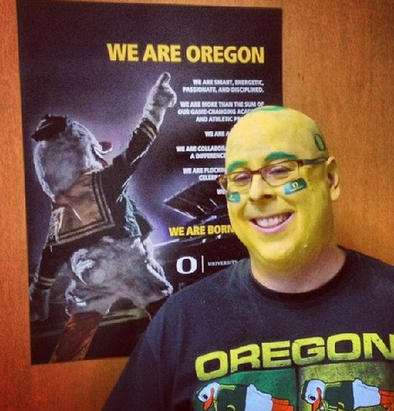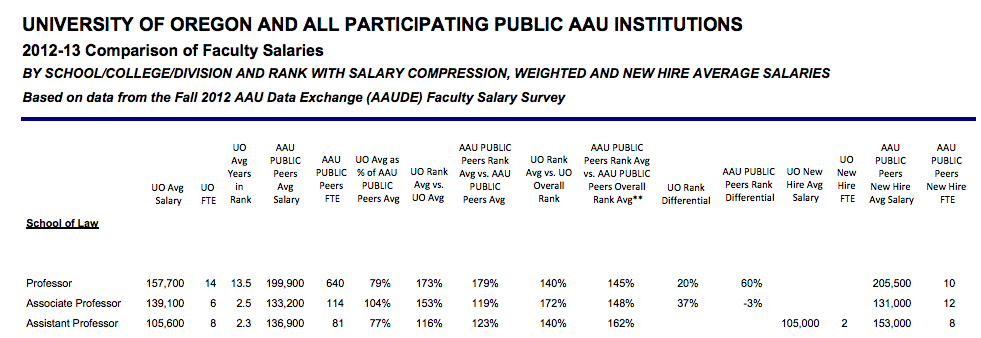10/31/2019: A Halloween reminder: 11/3/2016 update: 23 Angry Law Professors: 11/2/2016 update: Law Dean writes alumni condeming professor and racism and bigotry, then suspends her from teaching. KEZI posts professor’s explanation and apology. It seems she is not a racist or a bigot – quite the contrary: The KEZI report is here: “I…
Posts tagged as “Michael Moffitt”
Colleagues, It is my pleasure to announce that Marcilynn Burke will join the University of Oregon as dean of the School of Law. She will begin on July 1. An outstanding scholar and leader, Burke currently serves as associate dean and associate professor of law at the University of Houston,…
12/19/2016 update: Still no update from the UO administration on Professor Shurtz’s suspension or their investigation of her. Meanwhile FIRE, the Foundation for Individual Rights in Education, has this: Student Cleared of Baseless Charges from Anti-Lynching Art Display ROCK HILL, S.C., Dec. 19, 2016—A Winthrop University student was found not responsible…
11/4/2016 update: In case you are confused about why this blackface incident was so genuinely disturbing, Michael Hames-García (Professor of Ethnic Studies) has an excellent Open Letter to Pres Schill (and us all) in the Daily Emerald. Read it all, here is an excerpt: … Part of the problem with blackface is that white…
The search committee is here: Paul Elstone, Sr. Associate Vice President, Development, pelstone@uoregon.edu Jennifer Espinola, Dean of Students, School of Law, espinola@uoregon.edu Ibrahim Gassama, Professor, School of Law, igassama@uoregon.edu Tom Lininger, Professor, School of Law, lininger@uoregon.edu Mohsen Manesh, Associate Professor, School of Law, mohsen@uoregon.edu Michelle McKinley, Professor, School of Law,…
ATL has the leaked 2017 rankings here – they’re not out officially until next week. When Michael Moffitt started as dean, UO Law was ranked #77. They fell year after year, and were tied for #100 in the 2015 rankings. (Released in March 2014). After the $10M subsidy from VPFA Jamie Moffitt kicked…
Dear Colleagues, It is my duty today to announce that Michael Moffitt, dean, Philip H. Knight chair and professor of law, has chosen to step down as dean effective July 1, 2017. Michael will return to his faculty role, which he has held since joining the University of Oregon School…
I couldn’t listen to it all, but it seems Knight Law School Dean Michael Moffitt managed to avoid any mention of the $10M subsidy from CAS tuition money that he was given – by the office of his wife, VPFA Jamie Moffitt – to pay for scholarships for law students, to…
From: <deans-dirs-bounces@lists.uoregon.edu> on behalf of Kathy Warden <kathyw@uoregon.edu> Date: Wednesday, November 18, 2015 9:15 AM To: “‘deans-dirs@lists.uoregon.edu'” <deans-dirs@lists.uoregon.edu> Subject: deans-dirs: Reminder: Dean Moffitt’s 5-yr review presentation today Dear colleagues, This is a reminder that you are invited to Dean Michael Moffitt’s public presentation today at 12:00 pm – 1:30 pm…
No surprise the google algorithm matched us. I hear Illig’s program is doing OK. In contrast Law Dean Michael Moffitt’s Alternative Dispute Resolution program must have been hit hard by the recent NYT series exposing endemic corporate abuses of arbitration. Moffitt’s previous NYT exposure – the “business school case study” – ended pretty disastrously.…
It’s not going to go well. Moffitt was a compromise internal hire, after an external search went bad. His academic record was mediocre, and he has not been a success as dean. This 2013 NY Times story, in which he bragged about lucrative revenue from undergraduate courses and “living in a business school…
From what I can tell this money came from the general fund, i.e. mostly undergraduate tuition money from CAS students. The scholarships go to law school students with decent LSATs. More than a few get a full ride. For comparison, the UO Foundation spent roughly the same amount on academic…
“Above the Law” has the news about US News rankings, here. UO was #77 when we hired Michael Moffitt as Dean, and I believe #82 is as high as we’ve been since. UO was helped by a change in the algorithm that reduced the weight on temporary jobs that law…
Sure, Rob Illig has had some not so great press recently, but this new KEZI puff piece about his sports law camp makes him look pretty good. And while Dean Michael Moffitt got a mention in the NYT a few years ago, it appears he was less than completely honest about…
4/17/2014 update: And now the ABA Journal.
These emails have gone viral, with many hundreds of comments on law blogs like Lawyers Guns and Money, Tax Law Blog, Above The Law, Professor Bainbridge, JDU, Eschaton, Leiter’s Law School Reports, something called Gawker, and Jeff Manning’s piece in the Oregonian:
This was bad viral. The University of Oregon Law School professor’s wild rant about his compensation made Illig look petty and unsympathetic at the same time. More importantly, it shined a light on the raging debate about higher education, the value of advanced degrees and the mushrooming debt encumbering a generation of students.
The official UO law school blog – which, in an admirable demonstration of transparency actually allows comments, has responded:
To The Law School Community:
We’ve been getting some questions about a resolution brought to the last faculty meeting, and we’d like to share some information. Recently the University announced across-the-board cost of living adjustments and merit pay increases to take effect later in the year. A group of law faculty came up with the idea to divert the law school’s portion of the faculty merit pay funds to a post-graduate fellowship program for new law grads, in lieu of accepting a pay increase. Last Friday, this group brought this idea as a resolution (included below) to the regularly scheduled faculty meeting. A wide majority of those present voted to approve the resolution—in addition, a majority of the full faculty support the resolution.
We brought the matter to the Provost and although he is supportive of our goals he cannot bend the University rules to make this creative idea happen. However, we remain committed to finding ways to fund post-graduate opportunities and address other employment issues facing our graduates. We invite your comments and questions on this blog or one-on-one.
(I am not the Faculty Spokesperson. To avoid the appearance of speaking for everyone on the faculty, here I will include the names of some faculty who agreed to sign this statement (and I don’t mean to imply that those not included do not support it): Stuart Chinn, Michael Fakhri, Caroline Forell, Liz Frost, Erik Girvan, Carrie Leonetti, Mohsen Manesh, Roberta Mann, Michelle McKinley, Margie Paris, Jen Reynolds, Liz Tippett.)
Here is the text of the resolution from 4/11/2014:
The faculty recommends that the dean proceed with conversations with the Provost and the President regarding: reallocating funds for proposed faculty merit raises toward student fellowships, with a focus at present on post graduate student fellowships. If this proposal is approved, the faculty will revisit this reallocation of funds after two-three years.
4/14/2014: Several members of the law school email lists (which included staff, secretaries etc.) have forwarded these two emails from professor Rob Illig (Law) about a plan apparently floated by Law Dean Michael Moffitt (paid $292,800 after a recent raise) to deal with the law school’s enrollment problems and US News ranking, which has fallen from #80 to #100 since Moffitt took over in 2011.
The plan? Cancel raises for the faculty, and use the money to fund a program to give non-profits money to hire UO law school graduates, boosting the employment numbers that go into the US News rank.
Here are UO Law salaries for 2012-13, with comparison to other AAU publics:
Associate Professor Illig is not happy with Moffitt’s plan, or with the lack of transparency in how it was presented to the law faculty (who apparently voted to approve it).
Subject: Re: law-fac-staff: What happened to Oregon Law?
From: Rob Illig <rillig@uoregon.edu>
To: Rob Illig <rillig@uoregon.edu>
Cc: Dustin Littrell <littrell@uoregon.edu>, law-faculty Faculty <law-faculty@lists.uoregon.edu>, “law-fac-staff@lists.uoregon.edu Staff List” <law-fac-staff@lists.uoregon.edu>, Dan Miller <dmiller@uoregon.edu>
Michael,
To my shock and amazement, I just learned – three days after the faculty
meeting – that someone (you? the faculty?) is trying to take away my
one-in-a-decade chance at a raise WITHOUT MY KNOWLEDGE OR CONSENT.

